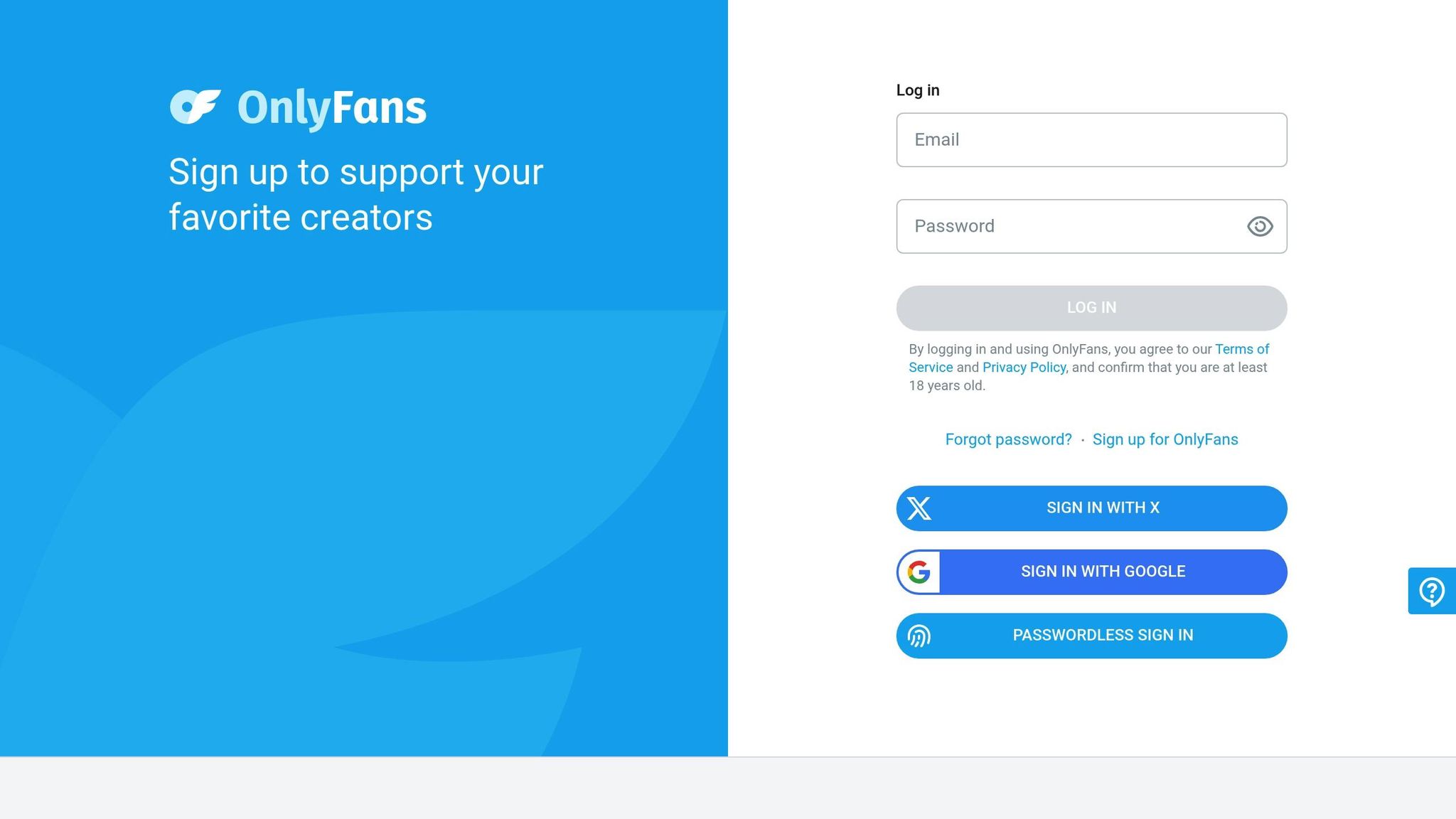Starting an OnlyFans agency in 2025 can be a lucrative business, but it requires a clear plan, legal setup, and hands-on management. Agencies help creators by managing tasks like marketing, fan engagement, and analytics, allowing creators to focus on content. However, it’s not a passive income opportunity – it demands full-time effort and expertise.
Key Takeaways:
- Earnings Potential: Agencies typically take 10–50% of creators’ earnings. High-performing creators drive most of the revenue.
- Business Models: Agencies can focus on management, marketing, or both, using commission, fixed-rate, or hybrid payment models.
- Legal Setup: Registering as an LLC, drafting proper contracts, and staying compliant with tax and content laws are critical.
- Challenges: High creator turnover, platform dependency, and cash flow management are common hurdles.
- Top Mistakes: Skipping a business plan, poor legal setup, ignoring analytics, overloading creators, and scaling too quickly.
Success depends on building strong systems, prioritizing high-potential creators, and staying data-driven. If you’re ready to commit and handle the complexities, it can be a profitable venture.
The NEW way to Start an OnlyFans Management Agency in 2025

How OnlyFans Agencies Work
OnlyFans agencies operate much like talent management companies, but within the digital creator economy. Their role is to handle the business side of things so creators can focus on producing content.
These agencies take care of essential tasks like social media marketing, fan engagement, performance tracking, customer service, and strategic planning. By managing these responsibilities, they lighten the load for creators and allow them to concentrate on their craft. This setup also highlights how agencies streamline operations and optimize efficiency for their clients.
A key advantage of the agency model is its ability to scale. Instead of creators having to become experts in marketing, analytics, and business management, agencies develop specialized systems and expertise that benefit multiple creators at once. Many agencies prioritize working with creators who have highly engaged fans or "superfans", as these audiences often drive a significant portion of the agency’s revenue.
3 Main Types of OnlyFans Agencies
- Management-Only Agencies: These agencies focus on handling day-to-day business operations. They manage account tasks like fan messaging, content scheduling, and basic customer support. This model works well for creators who already have an established audience but need help managing their workload.
- Marketing-Focused Agencies: These agencies specialize in growing a creator’s audience. They offer services such as social media marketing, cross-platform promotion, search engine optimization, and brand development. This type of agency is ideal for newer creators or those looking to significantly expand their reach.
- Hybrid Agencies: Combining both management and marketing services, hybrid agencies provide comprehensive support. They assist with everything from content strategy and audience growth to daily operations, analytics, and long-term business planning.
How Agencies Make Money
OnlyFans agencies typically use one of three revenue models:
- Commission-Based Model: The agency takes a percentage of the creator’s earnings, aligning their success with the creator’s performance.
- Fixed-Rate Model: A flat monthly fee is charged, offering predictable income for the agency regardless of fluctuations in the creator’s revenue.
- Hybrid Model: This combines a base fee with a commission on earnings, balancing steady income with performance-based incentives.
While these revenue models outline how agencies earn, setting up legally and ensuring compliance is just as critical for long-term success.
Legal Requirements and Setup
To operate in the United States, OnlyFans agencies must establish a proper business structure and follow legal guidelines. Many choose to register as Limited Liability Companies (LLCs). This structure protects personal assets, offers operational flexibility, and may come with tax benefits, all while enhancing the agency’s professional standing.
Contracts play a crucial role in defining the relationship between the agency and creators. These agreements should clearly outline revenue sharing, service expectations, termination clauses, and intellectual property rights. For example, details about who owns the content, how earnings are distributed, and how disputes will be resolved need to be explicitly stated.
Tax compliance is another important aspect. Agencies often work with independent contractors and may also employ in-house staff. Getting an Employer Identification Number (EIN), maintaining accurate financial records, and consulting accountants familiar with the creator economy are essential steps.
Agencies must also navigate digital content compliance. This includes adhering to copyright laws, privacy regulations, and OnlyFans’ terms of service. It’s critical to ensure that all content is either original or properly licensed, and that age verification and content guidelines are strictly followed.
State-specific regulations can add another layer of complexity. Some states impose additional licensing or regulatory requirements, especially for businesses involved in adult content. Consulting attorneys who understand local laws is highly advisable. Additionally, securing insurance – such as general liability, professional liability, and cyber liability – can help manage risks related to data breaches, disputes, and other challenges.
How to Grow Your OnlyFans Agency
Growing an OnlyFans agency isn’t just about signing up as many creators as possible – it’s about building a system that supports long-term growth. The most successful agencies focus on creators with dedicated superfans, as the majority of earnings often come from a small group of high-performing individuals rather than a large pool of mid-level creators.
Daily Operations and Workflows
Running a thriving agency starts with efficient operations. Agencies that succeed at scale rely on well-organized workflows that ensure quality and accountability across all creator accounts.
The key is specialization. Teams are typically divided into specific roles to maximize efficiency:
- Account Managers: Handle creator relationships and develop growth strategies.
- Content Coordinators: Oversee posting schedules and audience engagement.
- Customer Service Representatives: Manage fan interactions and inquiries.
- Analysts: Monitor performance metrics and identify trends.
This division of labor allows each team member to focus on their area of expertise, ensuring smoother operations and better results.
Automation is another critical piece of the puzzle. Agencies use tools to handle repetitive tasks like scheduling posts, responding to common fan questions, and tracking performance metrics. For example, automated dashboards can alert managers if a creator’s engagement or revenue dips below a certain threshold. These systems let agencies scale up without needing to hire more staff, keeping costs under control while managing a growing roster of creators.
With these workflows in place, agencies can focus on using data to make smarter decisions.
Using Analytics and Automation Tools
Data and automation tools are game-changers for agencies looking to grow. They help identify promising creators and optimize revenue streams by providing actionable insights.
Platforms like NimbusReach are especially useful for scouting talent. With advanced filtering options, agencies can search for creators based on niche, earning potential, and engagement rates. One standout feature is the platform’s Fan Devotion Score, which highlights creators with loyal, paying fans rather than those simply chasing high follower counts.
Analytics tools also help agencies stay ahead of trends. For instance, when a creator’s metrics show a sudden spike, agencies can act quickly to secure partnerships under favorable terms. Bulk export tools and detailed dashboards further simplify the process of tracking multiple creators, helping agencies identify which strategies are driving the best results.
Finding and Keeping Top Creators
The real challenge isn’t just finding talented creators – it’s keeping them. Agencies that build strong, long-term relationships with their creators tend to see better engagement and higher earnings.
To find top creators, agencies need to look beyond vanity metrics like follower counts. Micro-influencers, for example, often deliver better results. Creators with fewer than 50,000 followers typically achieve engagement rates of 5% to 20%, far outpacing the 1–3% seen with many larger influencers. Platforms like Instagram and TikTok are great starting points. Searching hashtags like #OnlyFansModel, #IGModel, or #TikTokCreator, and tailoring outreach messages to each creator’s style and audience, can make a big difference.
Other valuable sources for discovering talent include niche forums and communities. Reddit groups like r/OnlyFansAdvice and r/OnlyFansPromotion, as well as Telegram and WhatsApp groups, are particularly useful for finding creators in regions like Eastern Europe and South America. By offering genuine advice and sharing success stories, agencies can build trust and establish meaningful connections.
Referral programs are another effective strategy for acquiring talent. Offering existing creators bonuses of $200–$500 for successful referrals can create a steady flow of pre-vetted candidates. To ensure quality, these bonuses are often tied to the referred creator’s performance, rewarding results rather than just sign-ups.
Retention, however, is where agencies can truly set themselves apart. Most influencers (about 79%) prefer long-term partnerships because they provide stability and opportunities for growth. Agencies that prioritize fair compensation, creative freedom, and consistent communication tend to keep their top talent around longer.
It’s also important to align with creators on values and goals. Authenticity matters – 62% of consumers are more likely to trust brands whose influencers share similar values, which often translates into better performance. Agencies should focus on creators who genuinely align with their approach and brand identity.
To ease new creators into the process, many agencies offer low-risk opportunities. These might include salary guarantees of $500–$2,000 per month, trial accounts, or faceless content options. These strategies help establish trust and allow creators to experience the agency’s value before making a full commitment.
sbb-itb-bd3d2dc
Money and Challenges for New Agency Owners
Starting an OnlyFans agency can be a profitable venture, but it comes with its fair share of hurdles. Success often depends on navigating these challenges effectively.
How Much Money Can You Make
Most OnlyFans agencies work on a commission-based model, taking a percentage of a creator’s monthly earnings. The exact split and total revenue can vary greatly, depending on factors like the number of creators an agency manages, how much each creator earns, and the level of services provided.
Agencies managing high-earning creators with dedicated fanbases often see the bulk of their revenue coming from just a few top performers, rather than a large group of moderately successful creators. However, it’s important to note that gross earnings don’t tell the whole story – operational costs can significantly cut into profits.
But before counting potential earnings, it’s critical to weigh the risks that could impact your bottom line.
Main Problems and Risks
One of the biggest challenges for new agency owners is keeping a consistent roster of creators. High turnover rates mean you’ll need to invest heavily in recruiting and onboarding, which can be particularly costly for agencies still working to establish their reputation.
Legal and tax compliance is another major concern. Missteps in this area can lead to penalties, so staying on top of regulations is non-negotiable. Additionally, because the adult content industry faces unique hurdles, payment processing can be tricky. Finding reliable solutions often comes with higher fees.
Managing cash flow is also essential. Upfront marketing expenses can delay returns, creating temporary gaps in revenue that need careful planning to bridge.
Finally, depending too heavily on a single platform like OnlyFans is risky. Policy or commission changes could disrupt your revenue stream, making it important to diversify your creator portfolio across platforms.
To tackle these challenges, focus on building strong, transparent relationships with your creators and ensure you have a solid financial strategy in place.
Top 10 Mistakes Beginners Make When Starting an OnlyFans Agency
Starting an OnlyFans agency can be an exciting venture, but it’s easy to stumble into common pitfalls that cost time and money. Here’s a breakdown of five major mistakes beginners often make – and how to avoid them.
Mistake #1: No Clear Business Plan
Jumping into the OnlyFans agency world without a solid business plan is like trying to build a house without a blueprint. Many beginners assume they can figure things out as they go, but this often leads to wasted resources and confusion.
A business plan is your roadmap, guiding you through every stage – starting, structuring, running, and growing your agency. It helps you crystalize your vision and forces you to think critically about your goals, strategies, and potential risks before you spend a dime.
At a minimum, your plan should include:
- An executive summary outlining your vision.
- A market analysis to understand your competition and target audience.
- Details on your service offerings and organizational structure.
- A marketing and sales strategy to attract creators and fans.
- A financial plan with projections and a risk management strategy.
Keep it concise – ideally, one page. And set SMART goals (Specific, Measurable, Attainable, Relevant, and Time-bound). For example, instead of saying, "I want to grow the agency", aim for something like, "Sign 5 new creators within 60 days, each earning at least $2,000 per month."
Mistake #2: Bad Legal Setup and Contracts
Skipping proper legal setup is a recipe for disaster. Many new agency owners either ignore legal protections or rely on generic contracts found online, leaving themselves and their creators exposed.
A solid legal foundation protects your business, intellectual property, and relationships with creators, employees, and contractors. Consider forming an LLC to separate your personal assets from business liabilities and to potentially gain tax advantages.
Here’s what you need to do:
- Register your business in your state and obtain any required licenses.
- Create clear, customized legal agreements for creators and contractors.
- Consult a business attorney if you’re unsure about local regulations or contract specifics.
Getting your legal framework right from the start can save you headaches – and money – down the road.
Mistake #3: Thinking It’s Passive Income
One of the biggest myths about running an OnlyFans agency is that it’s a "set it and forget it" gig. In reality, successful agencies demand daily involvement and hands-on management.
Top-performing creators often need constant support, whether it’s help with content strategies, fan engagement, or promotional campaigns. Many agency owners find themselves working 60+ hours a week, especially in the early stages when they’re doing everything themselves.
The truth? This is a full-time business operation, not a side hustle. Be prepared to dedicate significant time to managing content approvals, tracking performance, and maintaining strong relationships with your creators.
Mistake #4: Ignoring Data and Analytics
Running an agency without tracking data is like driving blindfolded. Many beginners focus solely on total earnings, ignoring the deeper metrics that drive long-term growth.
Analytics tools are essential for understanding what works and what doesn’t. Platforms like NimbusReach can help you monitor engagement rates, audience growth, and content performance. These insights allow you to identify which creators have loyal, paying fans versus those with large but disengaged audiences.
Key metrics to monitor include:
- Fan retention rates
- Average revenue per fan
- Content engagement scores
- Growth trends
Regularly review these numbers and adjust your strategies accordingly. Most of your earnings will likely come from a small group of high-performing creators, so spotting their potential early is critical.
Mistake #5: Growing Too Fast Without Systems
It’s tempting to sign up every creator who shows interest, but rapid expansion without proper systems in place can backfire. Overloading your agency often leads to poor service quality, frustrated creators, and high turnover.
Before scaling, ensure you have the right tools, team, and workflows to handle the workload. This includes content management systems, communication protocols, and performance tracking processes. Starting with a manageable roster – around 3-5 creators for a solo operator – allows you to refine your processes and provide top-notch support.
Focus on maximizing earnings from your current creators before expanding. Once you’ve established reliable systems and possibly hired additional team members, you can scale your agency more effectively.
Should You Start an OnlyFans Agency?
Starting an OnlyFans agency offers the potential for impressive earnings, but it’s not without its challenges. Agencies typically operate on commission-based models, taking anywhere from 10% to 50% of a creator’s earnings. For example, if your creators collectively earn $100,000 in a month, your share could range between $10,000 and $50,000. While these numbers might sound appealing, reaching them requires a lot of effort, expertise, and strategic planning.
Running an agency comes with operational hurdles. You’ll need to address creator retention, navigate strict rules on social media platforms regarding adult content, handle the daily grind of managing multiple creators, and deal with the ever-present threat of content piracy. These challenges highlight the importance of having well-structured systems and a solid plan for scaling your operations.
Legal compliance is another critical factor. Make sure you’re familiar with the legal requirements and avoid the common mistakes outlined earlier in this guide to set your agency up for long-term success.
Success often hinges on focusing your efforts where they’ll have the most impact. Many thriving agencies prioritize creators with dedicated superfans, as a significant portion of revenue often comes from a small group of top-performing creators rather than a large number of mid-tier ones. Tools like NimbusReach can help you identify these high-potential creators using advanced analytics and their Fan Devotion Score, giving you the insights needed to make smarter decisions and maximize earnings.
If you’re considering starting an OnlyFans agency, be prepared to commit fully. This is not a passive side hustle – it demands your full-time attention, financial investment, and a disciplined approach. Success depends on excelling in areas like marketing, legal compliance, and data-driven strategies. With the right mindset and resources, this venture could be a rewarding business opportunity.
FAQs
What should I consider before starting an OnlyFans agency to ensure it’s the right business for me?
Before diving into the world of running an OnlyFans agency, there are a few critical things to think about. First, you need a solid grasp of the legal and financial responsibilities involved. This includes drafting fair contracts, managing revenue splits, and staying on top of local laws and tax obligations. These steps aren’t just about following the rules – they’re about protecting yourself and the creators you work with.
Next, take a close look at the market potential and your ability to connect with creators. Your success will largely hinge on how well you can market your agency, support the talent you represent, and foster a positive, collaborative atmosphere. Keep in mind, though, that challenges like managing daily operations, organizing content, and addressing legal concerns are all part of the package.
Lastly, think about what you bring to the table. Do you have the time, expertise, and network to thrive in such a competitive industry? Carefully evaluating your skills and resources can help you decide if launching an OnlyFans agency is the right move for you.
What steps should I take to ensure my OnlyFans agency operates legally and protects creators?
To run your OnlyFans agency within the bounds of the law and ensure creators are protected, the first step is to register your business as a legal entity, such as an LLC or corporation. You’ll also need to obtain an Employer Identification Number (EIN) from the IRS to handle taxes properly. Complying with federal regulations, like the Corporate Transparency Act, is essential, and you must verify that all creators are at least 18 years old to meet legal age requirements.
It’s equally important to adhere to FTC guidelines for honest advertising practices. Regularly reviewing OnlyFans’ terms of service and staying informed about local laws will help you maintain compliance. These measures not only protect your business but also provide a safer environment for the creators you work with.
How can I attract and keep top creators for my OnlyFans agency?
To bring in top creators, focus on social media outreach, online advertising, and networking. Connect with individuals who already have a strong and engaging online presence. Be sure to emphasize the perks of joining your agency – things like more exposure, professional guidance, and opportunities to grow their revenue. Don’t underestimate the power of personal referrals either; they can be a great way to discover talented creators.
When it comes to keeping creators on board, the key is building strong, lasting relationships. Offer personalized support, maintain clear communication, and provide meaningful incentives. Stay engaged with them regularly, provide tools that help them thrive, and make sure they feel appreciated. Loyalty programs, performance-based rewards, and fair, transparent revenue-sharing agreements can make a big difference in fostering long-term partnerships.






I love how this article emphasizes the need for a solid business plan. Without a clear structure, it’s easy to get overwhelmed. It’s also a reminder that starting an OnlyFans agency isn’t a passive income opportunity – it requires a lot of hands-on work!